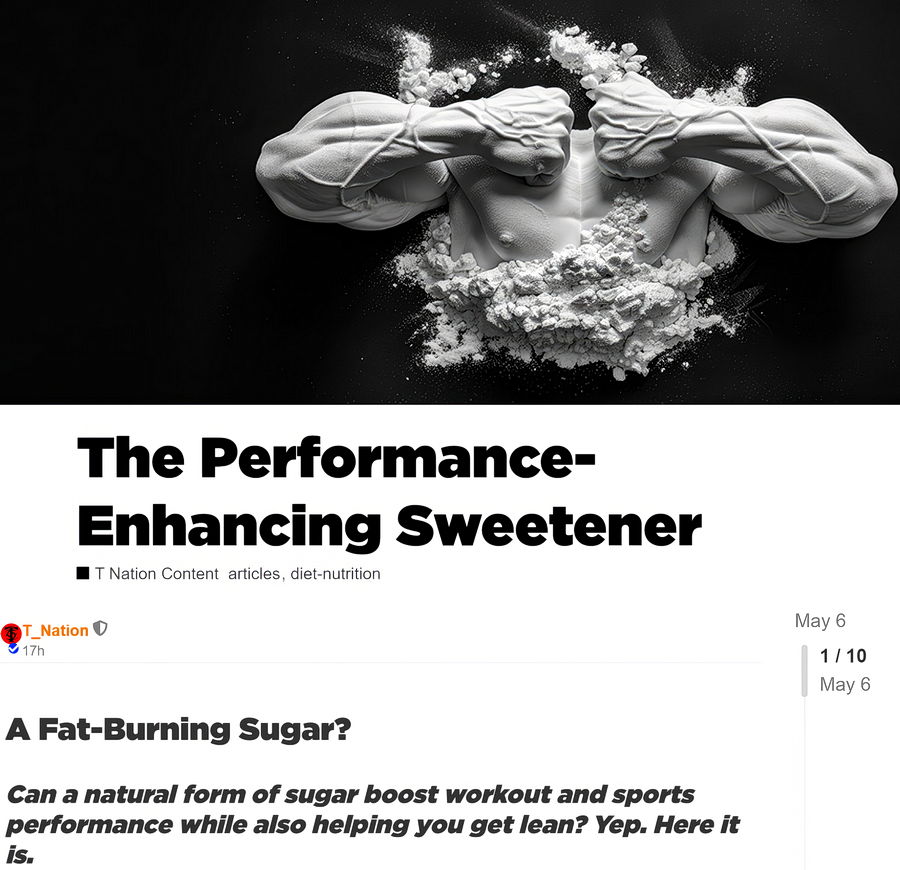Yesterday, May 6, T-Nation posted yet another advertisement article for their useless supplements. It seems most of their articles nowadays are just that – advertisements filled with pseudo-science and utter nonsense.
This time they began their “article” with a throwback to the 1950’s and the era of desperate ads by the sugar- and food industry touting sugar as a “superfood” to kill cravings and increase willpower as a countermeasure to health experts that had begun advising against the consumption of sugar. Many of those ads were aimed at parents and their children, which was pure madness and very evil.
The writers at T Nation called those old ads ‘laughable.’ Yes, indeed. However, you do know that idiom that… “people who live in glass houses shouldn’t throw stones,” right?
Well, apparently not, as the T Nation staff continued with:
“But there’s sugar and then there’s “sugar” – a disaccharide carbohydrate composed of glucose and fructose. Yes, chemically, it’s a type of sugar with a molecular formula of C12H22O11. And while that sounds like it was created in a lab, it’s found naturally in nature. One type is derived from beets.”
All ‘types’ of carbohydrates or ‘sugar’ still get broken down to glucose in our bodies, and since our blood glucose levels are strictly controlled by the process of gluconeogenesis, because a lot of tissues are very vulnerable to excess glucose, any increase above normal levels, as when consuming carbohydrates, is extremely toxic and damaging to the body.
Again, we humans are obligate hyper carnivores, we are meant to only consume the flesh and fat of animals. We are constructed to run on a fat metabolism. While we can tolerate some plant-based matter, it’s only a function of survival, to be able to get by if faced with shortage of real food. Also, every single plant food is damaging to us, which once again tell us that we should not consume them unless we really have to in order to keep us going until we can find real food again.
Also, sugar, or any carbohydrate, is not “naturally” found in nature. Carbohydrates are a synergetic part of the plant and often interconnected with the very harmful fiber content. Consuming a plant, fruit, or berry in nature would only yield a few grams of sugar, as the content is pretty low in real untouched plants and about half of it is bound to fiber and not absorbable.
You cannot compare this to any man-made product that contain any of these carbohydrates in refined form – separated from the plant. Simply a can of a sports drink or a soda would yield more sugar than you could consume “naturally” in nature without bursting your stomach with all you would have to eat.
And for beets, as with all modern “edible” plants, vegetables, or fruits, they have been heavily genetically modified and cultivated in strict environments throughout the years, and thus have very few similarities with the original beets you could find in nature and that poor low-class people once used as emergency foods after rigorous preparations to make it less toxic.
Remember, what you can buy in a store, including all vegetables and fruits, which you call “natural,” does not exist anywhere in nature. It’s all man-made. They are NOT natural.
“This type of “sugar” does much of what the vintage sugar ads claimed. In fact, it can legitimately be called a performance-enhancing substance. You may know it as isomaltulose or Palatinose.”
No, it cannot do what the foolish ads claimed in the 50’s. It might temporarily boost performance in someone with a severely damaged metabolism, as in a carb-junkie — because their bodies have been conditioned and damaged to rely on unnatural high levels of glucose. I’ve explained this in previous carbohydrate-related articles, especially about Cyclic Dextrin, and I guess I’ll have to touch on it again.
“Isomaltulose is known as a “functional carbohydrate” because it’s a low glycemic index (GI) carb that prompts the body into using body fat for energy by improving fat oxidation to a much larger degree than other carbs. Isomaltulose is the only carb that provides sustained energy while simultaneously supporting fat mobilization – releasing free fatty acids from fatty tissue. In turn, that greater fat oxidation rate improves endurance and athletic performance.”
First, the glycemic index is complete rubbish and pseudo-science. Second, this statement only applies when your body is under tremendous stress, as during intensive exercise or physical labor. As soon as you are physically active, your body will use both glucose and fat as energy. Because ‘isomaltulose’ is slowly digested, the glucose released from this disaccharide carbohydrate will not cause as high rise in blood glucose as other sugars, which means that your body will actually have to use a bit more fat for energy (than if you were to consume a different more fast-acting sugar.)
“One study found that the percentage of energy supplied by fat in isomaltulose-supplemented endurance athletes was 25% higher than in those who ingested maltodextrin (a carb used in many workout powders and energy bars). Another study found that isomaltulose caused insulin to rise 55% less than regular sugar.“
Yes, as I said, it’s absorbed more slowly. But this is still only relevant to someone who is a carb-junkie, someone who has been deceived into consuming carbohydrates and thus has a very damaged fat metabolism.
Isomaltulose still turns into glucose, and it still increases blood glucose levels which is harmful. Although some of that damage is mitigated if you consume it before exercise and use most of it as fuel, the fact still remains. If you were to consume it outside of exercise, you would get a very prolonged increase in blood glucose which would be extremely damaging. While simple/refined sugars will hit the bloodstream quicker, causing an initial larger spike in blood sugar and released insulin, any amount of carbohydrates will require the same amount of insulin to be stored away. In this regard, the fast-acting simple carbs will tax the organs as a lot of insulin has to be produced and released within a short period of time, while slow-acting complex carbs like isomaltulose will linger in your blood stream for a much longer time, inflicting more damage to glucose sensitive cells (such as endothelial cells in blood vessels, the vascular smooth muscle cells, the pancreatic beta cells, nerve cells, your kidney cells, your eyes, etc.) I’ve explained all this in detail in the article, “Any Amount of Sugar (Carbs) is Too Much!”
After this, the T Nation staff mentions GIP and GLP-1, two incretin hormones related to glucose metabolism and insulin secretion, which again is only of concern in metabolically damaged people who has been consuming carbohydrates. In a healthy human who runs on our natural fat metabolism, it’s totally irrelevant.
Remember, your body will never do anything wrong or do anything to hurt you, it will only adapt to its current environment and do its best to survive. Anything that “goes wrong” within your body is your own doing by not assisting your body but instead working against it, as for example, by consuming carbohydrates.
Then they cite some other study of high-level cyclists, which again is only relevant if you are an elite-level athlete who has been deceived into relying on carbohydrates while destroying your body by performing elite level sports, as in acting like a complete slave. Again, the favorable results were because of the exact same mechanics as I explained earlier.
“The researchers also speculated that the low-GI isomaltulose improved mental performance more than the higher glycemic index carb. Since cognitive performance increased during the time trial, so did physical performance.”
No, this had nothing to do with your ‘isomaltulose,’ it happened because they were forced to rely more on fat and ketones as a source of fuel, which are our natural energy sources, and ketones are a super fuel for the brain. This is why you are much more mentally awake and have a much higher cognitive ability when you are in ketosis and are fully fat adapted, as in when following our natural species-appropriate diet of strictly animal-based foods.
Only those who has been trapped in the carbohydrate prison and escaped it by adopting our natural carnivorous diet has really experienced this. Those who still consume carbohydrates and plant-based foods has no idea what it is to be fully mentally awake and aware, to be human, to actually live. They are simply trapped in their box, used to feeling a certain way that they think is normal.
Well, I’ve been there, and it’s not normal. It’s hell.
“While it provides a huge benefit to endurance athletes, isomaltulose also fuels longer or tougher gym workouts by providing sustainable energy, promoting fat-burning, and supporting muscular pumps.”
If you for some reason want to destroy your body by “longer and/or tougher” gym workouts, you will perform much better if you are properly fat adapted and only consume animal fats and animal protein, as you will have virtually unlimited energy from fat and also from glucose via gluconeogenesis.
Also, consuming our natural nutritious species-appropriate food will help you to heal and recover much better, mitigating some of the damage you do from all the excessive gym workouts.
As comparison, just look at any elite athlete who consume carbohydrates and plant-based slave foods. It doesn’t matter if they are muscular and ripped. They all look worn, and sometimes even twice their age – especially once they have reached the very young age of 40, which is nothing. Not healthy.
And that was pretty much it for this advertisement by T Nation. Again, trying different carbohydrates for a tiny bit of increased performance is only applicable if you have been deceived into following a diet with carbohydrates. Also, you will always perform much better without them, once you are fully fat adapted.
If you need help or want some guidance with nutritional plans, health issues, fat loss, and/or transitioning from your current way of eating to our natural species-appropriate, species-specific way of eating, or going fully ‘raw’ carnivore, I’m available for both coaching and consultation.

